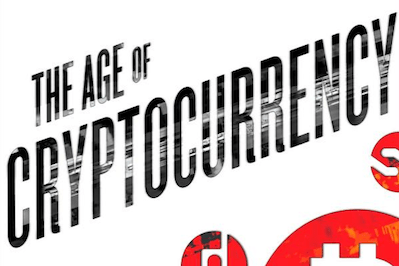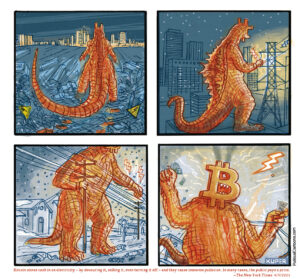The Age of Cryptocurrency
A new book examines Bitcoin, a “highly disruptive technology” that has the modest goal of “freeing people from the tyranny of centralized trust.” Image by St. Martin's Press
Image by St. Martin's Press
Image by St. Martin’s Press
|
To see long excerpts from “The Age of Cryptocurrency” at Google Books, click here. |
“The Age of Cryptocurrency: How Bitcoin and Digital Money Are Challenging the Global Economic Order” A book by Paul Vigna and Michael J. Casey
Bitcoin is remarkably polarizing. Technology evangelists and central-bank critics ardently believe — no, they know — that the digital currency can liberate mankind from the tyranny of banks and government-backed paper money. Skeptics note that, like other new technological disruptions, bitcoin attracts innovators and hucksters in equal measure. How can a currency created by an anonymous coder and backed by no state, and whose value flaps around like a flag in a swirling wind, hope to challenge the global economic order and replace the dollar?
To their ample credit, Paul Vigna and Michael J. Casey, veteran Wall Street Journal reporters, resist the common temptations to hype their trendy subject. They’ve written a reported explainer that patiently documents bitcoin’s rise, acknowledges its flaws and highlights its promise. Smart and conscientious, “The Age of Cryptocurrency” is the most thorough and readable account of the short life of this controversial currency.
Bitcoin isn’t actually money. Rather, it’s a “highly disruptive technology” — a software and transaction verification system that lets people communicate with others — that has the modest goal of “freeing people from the tyranny of centralized trust.” It came on the scene in 2008, when Satoshi Nakamoto (a pseudonym) introduced a peer-to-peer system that instructs computers how to keep track of transactions, using encryption and digital signatures, in a highly transparent way. The “blockchain” — a universal ledger that grows with each completed transaction — allows people to “exchange all sorts of digitized items of value and any manner of useful data with confidence that the information is accurate.” And it ingeniously provides financial incentives for people (or their computers) to keep the ledger up to date. How?
Transactions in bitcoin aren’t completed with a handshake or the issuance of a receipt. And unlike PayPal or electronic banking, they don’t involve the documented transfer of funds in specific currencies between large, licensed institutions. Rather, computers connected to the network must “reach a consensus on the validity of each transaction.” Transactions between two individuals are validated only when a third party — a “miner” equipped with a powerful computer — performs a complicated mathematical puzzle. The first to solve the puzzle receives a bitcoin as a sort of commission and officially updates the universal ledger.
The first commercial bitcoin transaction was completed in May 2010, when a Florida programmer named Laszlo Hanyecz offered 10,000 bitcoins to anybody who would pay cash to have a Papa John’s cheese pizza delivered to his house. A fellow enthusiast in England took him up on the offer. As more users adopted the currency, Nakamoto — who had announced that he’d issue only 21 million bitcoins over time — essentially disappeared. He (or possibly she?) last posted on the bitcoin forum in December 2010. “All we have is the specter of a reclusive genius, and a hint at the godhead of bitcoin,” Vigna and Casey write.
Like the Internet, bitcoin is a networks effect business — it becomes more powerful the more people connect to it. Vigna and Casey introduce us to the array of early adopters who have emerged from the woodwork to mine and buy bitcoin — and the wide variety of uses and hopes they have for it. We meet Austin and Beccy Craig, a young couple who tried to live for 90 days using only bitcoin. In Barbados, we meet Gabriel Abed, aka Mr. Bit, who sees the digital currency’s low transaction fees as a quantum leap for small Caribbean nations that currently maintain their own currencies. In Afghanistan, a nonprofit wants to use bitcoin to pay women, thus relieving them of culturally problematic visits to bank branches. The authors take us, too, to Silicon Valley, where young hackers and establishment venture capitalists such as Netscape founder Marc Andreessen are busily backing and building bitcoin apps, exchanges and businesses.It is impressive how a small community of enthusiasts has willed bitcoin from a theoretical concept into a cultural phenomenon. Bitcoin, improbably, has become a thing. But is it money? Here, the authors are appropriately skeptical — though perhaps not sufficiently so. “One familiar benchmark says that for a currency to become money it must function as a medium of exchange, a unit of account, and a store of value,” they write. Bitcoin has definitely succeeded in becoming a medium of exchange for some — Microsoft accepts it as payment. But a store of value? Not so much. “Bitcoin’s price in dollars soared 8,500 percent in the first eleven months of 2013, but then lost two thirds of its value in the following six months,” the authors write. In June 2011, about 7 percent of the bitcoins in circulation went missing from Mt. Gox, a bitcoin exchange that subsequently went bust. Whoops! Silk Road, an online mart where people could use bitcoin to buy or sell stuff anonymously — including drugs such as crystal meth, it turns out — was shut down by federal authorities in October 2013.
These are predictable growing pains — the early Web was a series of business debacles, and just look at it now. And the larger trends do seem to be working in favor of a payment system that avoids the high fees and political complications of banks. “This is a digital age, and bitcoin is digital money,” the authors write. “In a world where so much commerce is done online, simplicity and cost savings are in its favor.”
That’s all true. But bitcoin and other cryptocurrencies aren’t really challenging the global economic order. They remain marginal, unstable and little understood, and their spread has done nothing to chip away at the dominance of the Federal Reserve and the People’s Bank of China — and the currencies managed by those enormously powerful central banks attached to enormously powerful governments.
Beyond inertia and entrenched power, there are forces working against bitcoin in particular and against cryptocurrencies in general. In a world filled with ingenious hackers, digital thieves and other rogues, exclusively digital products — information, content, money — aren’t exactly safe. (Just ask Sony.) The potential for fraudulent transactions in some circumstances is also a worry.
What’s more, money is already going digital in ways that are challenging the primacy of banks. Apps such as Venmo let people send money to one another for free. In Africa, M-Pesa, which allows individuals of very modest means to send money via SMS text and store it via simple cellphones, already has 18 million customers and is doing far more to disrupt traditional banking than bitcoin.
The authors are right to conclude that we shouldn’t put all our chips on bitcoin, whose value in early January stood at less than one-quarter of its December 2013 peak. “Bitcoin will end up something less than the stateless, third-party-less utopian dream of its most passionate supporters,” Vigna and Casey write. It will continue to be a thing, not the thing. Even so, bitcoin will pressure incumbents and others in adjacent fields to innovate, much the way the Toyota Prius and Tesla have placed pressure on traditional automakers to step up their efficiency game. Thanks to the occasionally reckless and cryptic innovators of the bitcoin universe, the financial system “will have some much needed competition and discipline forced upon it.” You can bank on that.
Daniel Gross is executive editor at Strategy+Business. His most recent book is “Better, Stronger, Faster: The Myth of American Decline and the Rise of a New Economy.”
©2015, Washington Post Book World Service/Washington Post Writers Group
Your support matters…Independent journalism is under threat and overshadowed by heavily funded mainstream media.
You can help level the playing field. Become a member.
Your tax-deductible contribution keeps us digging beneath the headlines to give you thought-provoking, investigative reporting and analysis that unearths what's really happening- without compromise.
Give today to support our courageous, independent journalists.





You need to be a supporter to comment.
There are currently no responses to this article.
Be the first to respond.